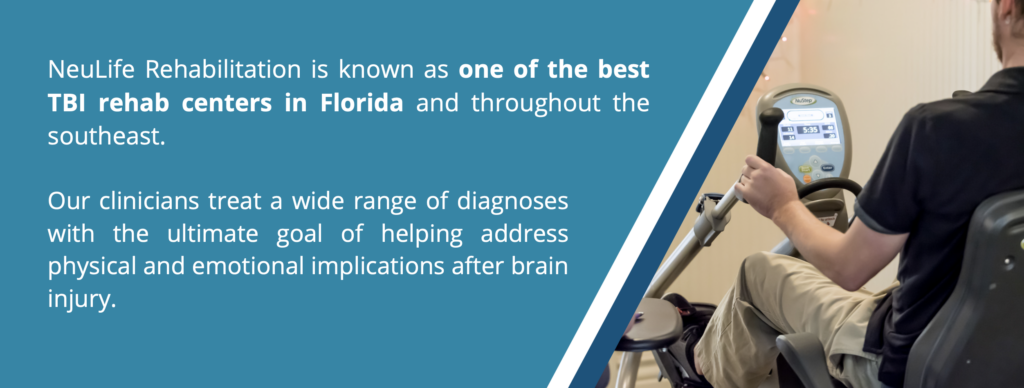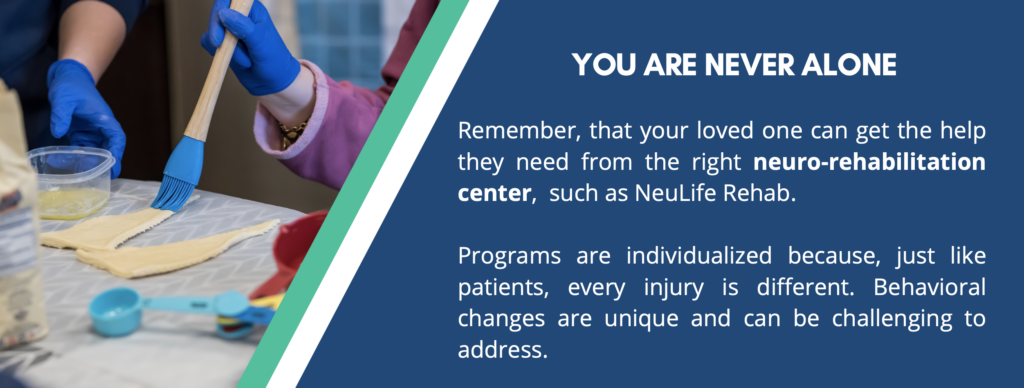It is normal for patients who have suffered from a traumatic brain injury (TBI) to have behavior problems. The behaviors can vary greatly from person to person. Some may seem exaggerated from their normal, while others are out of character.
But the good news is that your loved one can get the help they need from the right neuro rehabilitation center. Programs are individualized because, just like patients, every injury is different. Behavioral changes are unique and can be challenging to address.
Neurorehabilitation centers, such as NeuLife Rehab, address the cognitive and behavioral side to regain functional skills. Programs teach communication, impulse control and improve concentration skills.
Through rehabilitation, patients can integrate back home with their families and into the community as successfully as possible.

Following a brain injury, it can be difficult to see the personality changes that happen to those we love. It is best not to try to compare the patient to who they were before the injury. It is important to remember the changes in behavior are not the patient's fault, as it is a result of damaged brain cells.
Below, we will now provide an overview of common personality changes seen in patients at neuro-rehabilitation centers.
Patients can say or act out without thinking of the consequences after a brain injury. Family members may be embarrassed by the behavior.
It can also affect patients' outcomes as they may agree to complete a task that is unrealistic or outside of reason. Patients may also spend money without thinking of the result.
TBI patients experience both short and long term memory loss. Sometimes they experience amnesia for certain periods.
Often patients see the most difficulty with new learning. By repeating additional information or repeated activity engagement, patients can be more successful.
Patients also benefit from what is known as "real-time learning." Rather than reading knowledge, they are encouraged to engage in retention activities.
Therapies focus on keeping distractions to a minimum, completing one task at a time, and giving few commands.
Obsessive behaviors can be seen in TBI patients as a fixation on certain thoughts. Patients may do routine activities repeatedly or consistently seek reassurance.
Establishing structure can be helpful, so they move appropriately from one task to another. Appropriate reassurance with boundaries can help, so the patient does not become too agitated or anxious.
A patient with a brain injury may experience a lack of emotional response. Patients may not smile, laugh, express anger, or cry in instances where they may have before.
You can encourage emotions from your loved one, including laughing at humor or crying for grief. Again, try not to take it personally if their response is inappropriate because it is not because they do not care.
A TBI can cause extreme mood swings, known as emotional lability. It may show up as severe reactions to normal events. Recognize it is not intentional, and the patient does not have control over the responses.
It is recommended to remain calm and role model appropriate behavior. Reduce stress by not being overly critical, angry, or emotional. With time encourage appropriate reactions.
Irritability is a common personality change in TBI patients. Patients may be inpatient, intolerant of mistakes, or show irritation when anything disrupts their concentration.
Family members often report outbursts of verbal and sometimes physical aggression. In any situation, try to remain calm and ignore irritability.
If it is safe, acknowledge their frustration before it turns to anger. Try to show empathy and support if you can. Also, be consistent and avoid confrontation as much as possible.
You can sometimes help the patient gain control by asking if there is anything you can do. Try to remain patient and treat every outburst as a single event as the patient may not remember the incident.
TBI injuries may contribute to egoistic behavior. The patient may be self-centered or inconsiderate of friends and family's needs.
Though it is human nature to have an ego, it may be exaggerated in the brain injury patient. You may note they are either oblivious or unable to understand others' viewpoints.
Why does this happen? The injury impacts abstract thinking, so the patient may say thoughtless or hurtful words without understanding the impact.
You can help your loved ones by reminding them to be polite. Support the patient as they relearn how to be aware of others' feelings.
It is normal for TBI patients to have trouble concentrating. Simple reminders can help improve attention. It may also help break down tasks and information, so it is easy to understand.
Also, check-in with the patient's regularly regarding their mood. If they are tired, angry, or full of anxiety, it may not be the time to take on a difficult task. It also encourages patients to check in with themselves.
Through error correction, patients learn to modify concentration. Also, don't forget to praise in order to provide positive reinforcement.
Both increased and decreased sexual interest is seen in brain injury patients. Both hormonal and emotional influences are responsible.
It is best not to pressure a spouse for sexual activity if they show disinterest. Continue to show appropriate love, affection, and encouragement.
If the patient is showing increased sexual interest, it can be alarming. Patients may make gestures or comments in public, use inappropriate touch, or look for sexual attention.
It is very important to remind the patient about what behavior is appropriate. Be consistent with boundaries and remove yourself from the situation if they are disrespected.
Supportive care and even medications can sometimes be helpful for inappropriate sexual behavior.

NeuLife Rehabilitation Center is known as one of the best and TBI rehab centers in Florida and throughout the southeast. Our clinicians treat a wide range of diagnoses with the ultimate goal of helping address physical and emotional implications after brain injury.
We help our patients' get their life back'. If you would like more information about our services, do not hesitate to contact us today. Make a referral or give us a call at 800.626.3876.
The material contained on this site is for informational purposes only and DOES NOT CONSTITUTE THE PROVIDING OF MEDICAL ADVICE, and is not intended to be a substitute for independent professional medical judgment, advice, diagnosis, or treatment. Always seek the advice of your physician or other qualified healthcare providers with any questions or concerns you may have regarding your health.

We know that choosing the next step in your recovery from a catastrophic illness or injury is complex. Together, we can help you take the next step.
Contact us with any questions today.